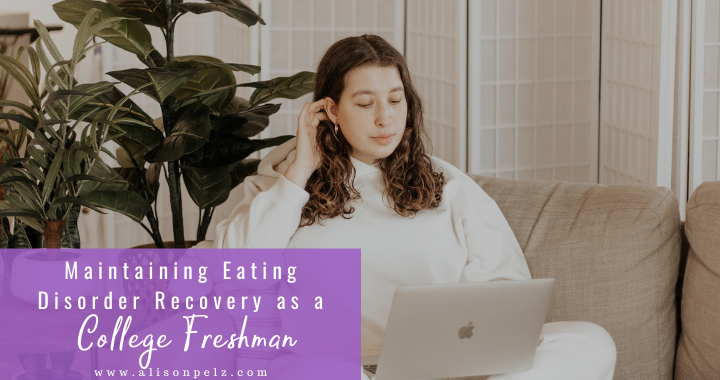College can be a difficult transition for anyone, but if you’re in recovery for an eating disorder, it can be a particularly stressful transition!
Some of the challenges of maintaining your recovery while returning to school include:
Change in Routine
When in recovery, changes in routine can be tough. Routines allow for some comfort and dependability, because when we have them, we know what to expect. Routines also have very practical uses in recovery–they affect meal planning, treatment appointments, sleeping habits, etc. All of which play a role in recovery! Navigating a new routine can be challenging, and can feel overwhelming, so giving care and consideration to what your new routine will be is important.
Increased Demands + Independence
Going to college is an exciting time because it is the first taste of independence so many of us have! However, gaining independence is also a lot of responsibility–especially if we’re not used to it. It can be easy to not set any boundaries for yourself, but that’s not a sustainable way to take care of yourself. At the same time, you’ll also need to use some of that newfound independence to balance the demands of your school work, which might be more intense than you’re used to. It can be extremely stressful navigating that responsibility for the first time, and increased stress can lead to an increase in eating disorder symptoms.
Exercise + Diet Culture
On a college campus you’ll be surrounded by other young people, who are also surrounded by the constant messaging on social media about diet and beauty standards. Additionally, gyms on campus may be full of college level athletes training in ways that other folks who don’t need intense conditioning for a sport shouldn’t be pushing themselves to compete with. You might be surrounded by fear of the “freshman fifteen” or feel pressure to skip meals to study for exams with other students. The culture around food and exercise on a college campus may not be the healthiest one–and it’s important to prepare for that with a counselor beforehand so you have coping mechanisms you can use when need be.
What can you do to maintain your recovery?
Consider your schedule
Be gentle with yourself as you adjust! College is a big change and you don’t need to try to do it all at once. This means, don’t push yourself to take too many classes your first semester while you’re still getting used to the new expectations. Really think about what your limit is before you feel yourself burning out.
Consider also taking classes that you wouldn’t consider as the most challenging. It’s a whole new style of learning in college, there’s nothing wrong with taking it slow to figure out what you can handle. That way you’re not overworking yourself and you are reducing the amount of stress you might experience.
When thinking about your schedule, consider any habits you have that are helpful to your recovery (social meals, treatment appointments, etc.) and what will be needed for those in your regular routines.
Make a recovery plan before you go
Are you working with a therapist right now? Will you continue to work with them? Or will there be someone on campus to connect with? Have group supports been part of your recovery plan? What is available in terms of group support at your school? Does your current therapist have plans or ideas on what will be important to your recovery at school?
Be sure to set up any regular appointments and checkups with your treatment team ahead of time, to help provide you the professional support you may need to stay “on track.”
Are you working with a dietitian right now? Work with them to help you maintain recovery.
You might want research on what mealtimes are like at school. Consider questions like: What food is available when? Where are the places to eat? What are their hours? Do you know what food do they provide? What are the meal plans like? Is there one that is more conducive to your recovery? Together with your dietitian it might be helpful to gather some information about what the different meal plans are, and make some pros and cons for each of them.
If you don’t have a treatment team, go to the student health center on campus and they will be able to assist you.
Remember: it’s normal for eating disorder symptoms to recur in times of high stress and periods of transition. But by taking time to consider how your recovery will be impacted in this period of transition, you can create a plan to cope with stress and continue with your recovery. Remember, you only have to take it one day at a time!
